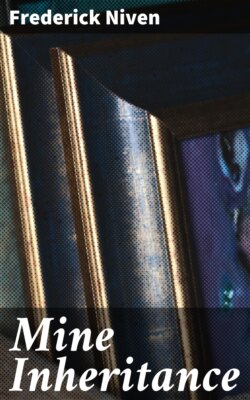Читать книгу Mine Inheritance - Frederick Niven - Страница 21
На сайте Литреса книга снята с продажи.
I
ОглавлениеTable of Contents
Pembina: a North-West Company fort, a collection of log cabins, leather tepees, bark wigwams, sixty miles south of the confluence of the Assiniboine and Red Rivers.
There, under the direction of John McLeod, with whom I had made friends on the sea-voyage, a post for the Hudson’s Bay Company had been built called Fort Daer and, at the same time, more cabins, these to shelter the settlers close to the buffaloes’ winter grounds. Some had no windows. Some had windows of parchment, pieces of skin scraped amazingly fine and stretched across the spaces left for them. When it was raining, or there was moisture in the air, they relaxed somewhat and on dry days tautened. Occasionally, when the sun had been warm on the outside, or the stove hot within, the parchment would emit a small ting! It reminded me in a way of the sound the river made before Nelson Encampment in the spring when the ice was cracking. It was as a faint, far echo of that.
McLeod and his party had worked well. I know that Captain Macdonell would have rejoiced to have him in the Colony service but he was a Company officer and soon after the installing of the settlers who were to winter there he went off, by orders of Heney (who in those days had the management of the Company’s affairs in that district) with another Hudson’s Bay man, Bostonois Pangman, as interpreter, he speaking the Cree tongue and the Assiniboine—which is the same as the Dakota—to establish a trading post by Turtle River.
I was glad that Mr. Spencer had been given the position of assistant-governor for thus, while he remained at Red River in charge of the winter activities there, I continued my secretarial work under Captain Macdonell at Fort Daer, Pembina. Often, when we were alone, the Governor would relax, suspend his authoritative manner. At the back of his mind all the time was anxiety regarding the supplies for his people—the supply of that staple of pemican. Not only those he had brought there, close to the hunting grounds, had to be considered but those at “the forks.” These métis, he said, seemed to him too carefree. On the fringes of the village were tepees of Indians and thud-thud, thud-thud went the drums out there night after night. Always they were dancing. In Pembina itself the fiddles of the half-breeds were playing, accompanied by other drums. The full-bloods had not adopted the violin but the half-breeds had retained the tom-tom.
The verve of these dances was extraordinary. In one of the larger cabins the women sat round the walls while the men clustered in the middle and violins began to play, drums to beat. Wrapped in their shawls or blankets the women kept time to the rhythms where they sat, shoulders swaying; and the men pirouetted, pranced about for a time, tapped out the beat with moccasined feet, advanced to claim a partner, gave her a little bow in the manner of white men, then flinging out a hand snatched her up and away they would go in the most vigorous jig imaginable. When, after watching them, I went out from the heat into the prairie air I would hear the other music from farther back in the history of the world, before fiddles, an agitating pulse—the drums of the dancing full-bloods camped close by. That music variously affected different hearers. To Miles Macdonell I know it was as if the violins and drums joined together in a plaint of No pemican, no pemican, no pemican. Would these people never get out to the promised hunting? No pemican! No pemican! To some of the young men who had complained of Owen Keveny that he was despotic, those whom he had considered unruly, the sounds of that music in the evenings was exciting. With proper negotiation, they thought, they might have more than dancing, might lure away a wild partner into the riverside brush. The thud-thudding of the Indian hand drums sometimes caused a look of dread, I noticed, to show on the face of a woman here and there. Assuredly they had come into a new world, and they were not at ease in it, were apprehensive. Thud-thud, thud-thud, thud-thud: there was something in that sound—especially when voices came with it, rising, rising, higher, higher as more fervently the drums beat in the full-bloods’ camp—that was positively alarming to them.
For me there was more appeal in the drums and voices than in the violins alone. Their rhythms moved me deeply, strangely. I felt that they belonged to antiquity on these plains. They were very old. They told of æons, æons of such nights and of the generations that had once danced to them and were gone. What an amazing response my throbbing heart gave to these throbbing drums, how poignantly the chanting voices moved me. I was on the edge of a world of which I would fain know more. Assuredly I, at any rate, had come into a new world.
